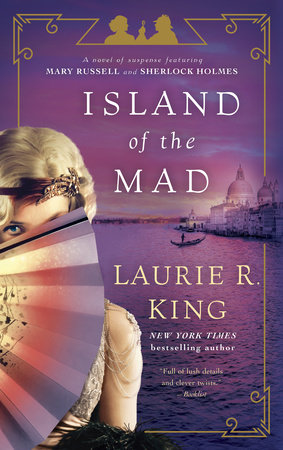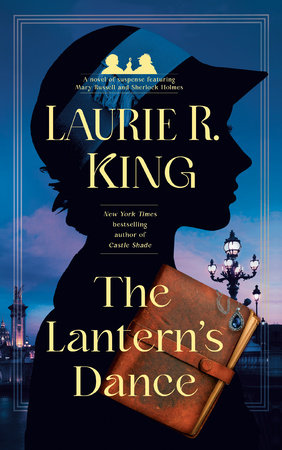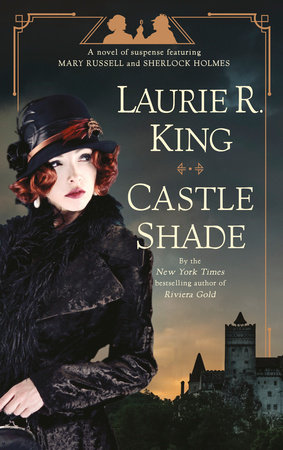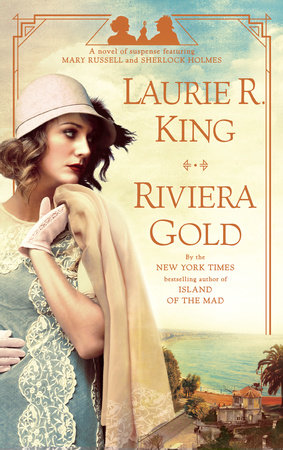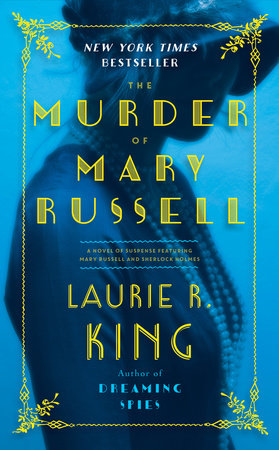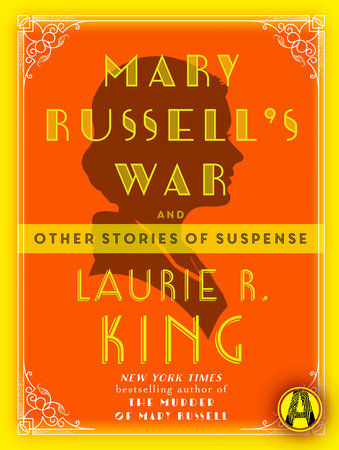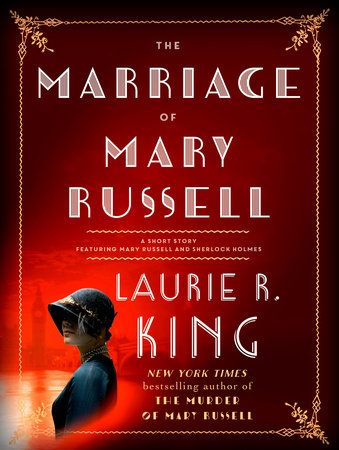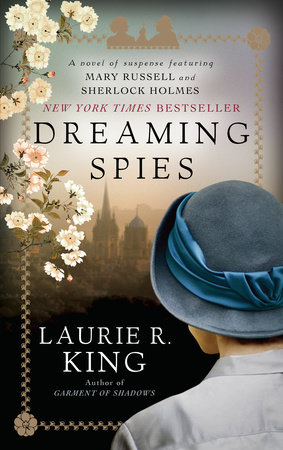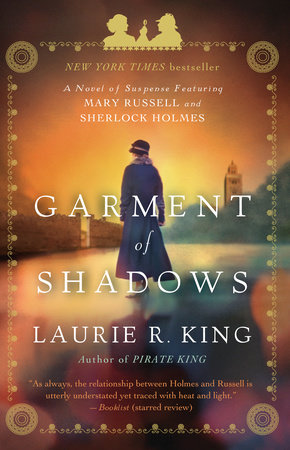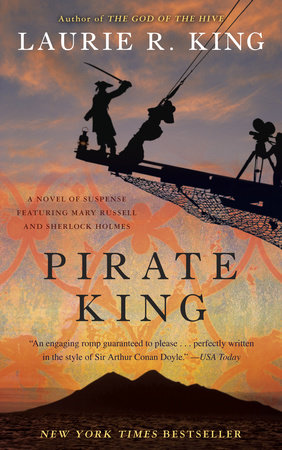Excerpt
Island of the Mad
Chapter One
Sherlock Holmes and I stood shoulder to shoulder, gazing down sadly at the tiny charred corpse.
“She should never have left us alone,” I told him.
“She had no great choice in the matter.”
“There’s always a choice.”
“Strictly speaking, perhaps. But it’s best that she disappear, at least for a time. Even putting aside the death penalty, I cannot see her thriving in prison.”
I had to agree. “She is probably better off in Monte Carlo.” And so saying, I snatched up the smouldering pan and tipped my attempt at a chicken dinner into the rubbish bin. Our long-time housekeeper, Mrs Hudson, had recently abandoned us, selfishly choosing freedom over being tried for murder—and thereby risking our lives to my poisonous culinary skills. “Cheese sandwiches, then? Or shall we walk up to the Tiger?”
He glanced at the kitchen clock. “Do you suppose Tillie might have a table, up at the Monk’s Tun?”
Three hours later, we were making our leisurely way towards the gate in the stone wall encircling our house. I had pocketed a torch as we left, but the midsummer sky held enough lingering brightness that we did not need it as we returned across the Sussex Downs. Tillie had outdone herself, with a perfection of cool dishes on a warm afternoon: subtle lettuces, an iced soup, cold meats, hot rolls, and a strawberry tart the likes of none in the land.
The one drawback was, the Monk’s Tun had begun to collect a reputation. Not that I begrudged Tillie her success—although I might wish we had not chosen to stop in the same night as a carload of Young Things on their way up from Dover.
Not that they were drunk, merely festive; nor were they loud, exactly, merely difficult to ignore. They were my age—in fact, two of them I dimly recognised: a young man with dark Byronic curls who had been the year before me at Oxford, and a girl whose face appeared in the illustrated Society pages of the newspapers. My eyes kept going to them, two sleek girls in Paris frocks, two clean, tanned lads in casually worn suits that would have cost Tillie’s barman a year of his salary.
The second time Holmes had needed to repeat something, he craned around to look at the table of merrymakers on the other side of the old room.
“Friends of yours?”
“Good heavens, no.”
“Then why are you watching them so closely?”
“I wasn’t. Not really. Just—they seem like an alien race, down here in Sussex. Don’t you think?”
His grey eyes fixed on me, but before he could speak, Tillie came up to greet us, and the next course arrived, and the moment was lost.
However, Holmes never forgot anything. When he pushed open the gate an hour later, he said, “Russell, do you regret the choices you made?”
Little point in pretending I didn’t understand. “Regret? Never. I might occasionally wonder what life would have been, had things been different, but it’s mere speculation. Like . . . like trying on a dress I’d never actually wear, just to see what it feels like.”
He closed the gate and worked the latch. We picked our way through the grassy orchard, hearing the faint texture of sound from the hives—drones cooling their homes from the day’s heat. Near the house, the sweet odour from the old-fashioned climbing rose drew us forward.
Mrs Hudson had planted the flower, long before I knew her. Mrs Hudson, now gone away, to . . . But before yearning could overcome me, the night was broken by the jangle of the telephone bell.
Neither of us hurried to catch it.
And neither of us suggested, when the machine ceased its clamour before we were halfway through the kitchen, that we ask the Exchange to restore the connection.
Instead, Holmes pulled a corkscrew from the drawer and a bottle of chilled honey wine from the cooler. I fetched a pair of glasses from the cupboard. We left the door open, to chase away the aroma of cremated chicken, and settled into our garden chairs. The night smelled of blossoms and honey. The low pulse of waves against the Sussex cliffs obscured the sound from the hives. The wine was cool, but faintly sad as its summer freshness faded, giving a hint of bitterness to come.
And the telephone rang again. At this time of night, the sound was ominous.
With a sigh, I put my half-empty glass onto the stones and went through the terrace doors.
I spoke our number by way of greeting, to be answered by a voice from the local Exchange. “Evening, Mrs Holmes, sorry to ring so late but the lady said it was an emergency, so I told her I’d keep trying you. And the girl at the Monk’s Tun said you’d left there. Do you want me to connect you again?”
Life in a rural area is rich in many things, but privacy is not one of them. “Hold on a moment, I’ll get Holmes.” The word
emergency generally summoned Sherlock Holmes.
But to my surprise, she said the woman had asked for me.
“Did she leave a name?”
“She said to tell you it was Veronica Fitzwarren.”
Ronnie. Oh dear.
I pulled up the chair we kept near the telephone, and sat. “Yes, you’d better put me through.”
… Chapter Twenty
The train came to its end on Sunday, two days and four nations after we’d stepped out of our Sussex door.
The ideal approach to Venice is from the sea, standing at a ship’s rails as the faint traces of buildings take form through the mists. She resembles (and I must agree with tradition here: Venice
is feminine) a queen seated on a throne in a wide, fat field. Solitary and regal, she waits in patience for those who would come to do homage.
Instead of that entry to
la Serenissima, we puffed across two miles of water on hundreds of stone arches, waited while the customs men came to check our hand luggage, and climbed down into the cacophony of any railway station on the planet. The salty air churned with the sounds of shouting porters and crashing equipment, customs inspectors and street urchins, the hiss of venting steam and the slams of compartment doors, cries of greeting and the occasional shriek of a traveller seeing her bags vanish into the crowd.
And yet, this was different. There was no stink of idling taxis, for one thing, no clop of hooves or rumble of motor lorries or whine of motor-cycles. We were in a port city, yet there was no sign of heavy-goods traffic. Groups of laughing foreigners suggested a resort town, yet bright holiday clothing was more than balanced by workaday garments. Uniforms of various kinds put the crowd into order, funneling traffic from iron rails to waterborne craft.
I watched the familiar scene with pleasure, until my eye was drawn to an oddity: two black-clad figures created an eddy in the swarm, in a way that even the customs men did not. Most of the people giving them wide berth seemed unaware that they were doing so, but even the laughing tourists subsided a touch as they approached the Blackshirts, and their laughter resumed only when they were out of earshot from the two Fascist representatives.
I shook of the creeping awareness of the outside world and turned my mind to our next moves.
The previous Friday, when Thomas Cook & Co. had proven a broken reed and failed to come up with adequate rooms, I had dredged the name of a hotel from the depths of memory and sent them a wire. We had left Sussex before any response could arrive, and since the tourist season was clearly well under way—despite heat, Fascists, mosquitoes, and the stench of summer canals—I only hoped that someone had recalled my mother’s name with enough affection to offer us a servant’s room under the sweltering eaves.
As I prepared to join the milling crowds heading towards the water and thus the Venetian equivalent of a taxi, I became aware that there was a person standing before me, very still and quite close. I adjusted my eyes, and found a trim young man in hotel livery, with a name in fancy stitching on his breast:
Hôtel Londres & Beau Rivage “Signore and Signora Russell?”
“Yes,” Holmes said. Thanks to Mycroft, he even had a passport in the name of Sheldon Russell, an ebony-haired gent, pampered and well glossed from the tips of his shoes to the teeth behind his pencil-thin moustache. Thin disguise, but along with the change in his stance and the languid air he wore, even someone who knew him would hesitate, wondering, might this be a cousin . . . ?
“The keys to your luggage, please? I shall see it through Customs. Come, your boat is just here.”
I followed his pointing finger, and saw a sleek steam launch with a man in the same uniform. I held out the keys and my valise, but told him, “We’ll walk, thanks. It’s been a long train ride. Oh—and tell the maid not to unpack the bags. We prefer to do so on our own.” And had, ever since the day one inexplicably thorough hotel maid had happened across a hidden compartment, dutifully removed the contents for cleaning, and sent a bullet whizzing through the next room.
The hotel man bowed, cheerfully acknowledging our English eccentricity, accepted my tip, and trotted to the hotel launch with our valises.
As he explained, hands gesturing, that these mad English guests wanted to walk to the hotel, the even sleeker launch beside it drew in its gangway and let out a belch of steam. This one bore the name Hotel Excelsior, and it turned away with an air of disdain, as if to show that
its guests did not need to wait along with
hoi polloi. The launch went serenely off, ignoring the gondolas, cargo transports, fishing boats with furled sails, many varieties of shallow-hulled canal boats, and one lone rowing skiff.
Holmes scowled at our own waiting launch. “Do you suppose we shall ever see our possessions again?” he asked me.
“It’s quite a good hotel, Holmes.”
“All the more reason for a thief to pick their jacket out of a laundry.”
Was I being naïve, gullible—touristic? I did not think so. “Venice has little serious crime, and a very clear sense of honour.”
“Amongst thieves,” he grumbled, so I slid my arm through his and urged my husband and partner towards the foot-bridge linking the modern world with the timeless city known as
la Serenissima. This most unlikely of cities grew out of the waters centuries ago, a refuge from chaos following the disintegration of the Roman Empire (another power that kept the trains running, metaphorically speaking).
Its residents expanded their literal footholds in the lagoon by driving trees down into the mud and perching buildings on top. Before long, its ships ruled—and plundered—the known world.
In the process, Venice gave rise to an idiosyncratic, oddly democratic, and utterly ruthless system of government. The Doge and his Council were absolute rulers, and yet a constant and precarious balance of power ensured that no one man—or even family—could establish a permanent authority over the others. A Doge’s salary was small, forcing him to maintain his interest in healthy commerce. After a Doge died—and the number of Doges who failed to succumb to natural causes served as a cautionary tale to each successor—his estate was reviewed, and pillaged if there was found any trace of misdoing.
This inborn system of stalemate proved popular with the Venetians themselves, since it allowed them to carry on the business of business while the government squabbled and bickered and compromised itself into stability. It also, incidentally, laid the groundwork for America’s three governmental branches, designed to frustrate each other into tiny increments of progress.
For eleven centuries, the Venetian system held—until Europe on the one hand took to the seas and cut out the Venetian middleman, while the Ottomans on the other side grew powerful enough to block the formerly bottomless stream of trade from the East. When Bonaparte passed through Venice in 1797 on his way to a more important enemy, he decided, like any lesser tourist, to ship home his pick of the city’s riches. “I shall be an Attila to the state of Venice,” he thundered. Since the Venetian Navy consisted of but a dozen galleys, its Doge abdicated, and a thousand years of Republic quietly ended.
Under the Bonaparte régime,
La Serenissima lost her independence, her authority, her vast agricultural hinterland, and a great deal of her art. (Most of which, to be honest, had been stolen in the first place.) Stripped and powerless, she was thrown to Austria in the peace accord. But her stones remained. Like many other crossroads of trade—Jerusalem, Cairo, Tokyo—the wealth of the city lay indoors, hidden from passers-by behind inscrutable faces.
As inscrutable as the faces of the residents.
“Venetians seem to have a very clear sense of Us and Them,” I mused. “Or rather, Us and You. Anyone who isn’t Venetian is by definition a customer, brought for the express purpose of having money removed from their pockets. But like any people who spread out across the world, they’re not fussy about how people claim residency. If you eat at a restaurant three times, you’re part of the family. If you hire a gondolier for a season, you’re expected to hire him the next time you show up, or God help you.”
As we walked, as my reflections on Venetian history eventually brought me back to the idea of our luggage sailing off with a clever thief, I felt Holmes glance down at me in growing consternation. Finally, he dropped his arm.
“Russell, how are you so familiar with this place?”
It is very seldom that one can achieve superiority over Sherlock Holmes, but I concealed my gloating expression behind a serenity fitting of our locale.
…Chapter Twenty-Two
We were on our balcony at dawn, watching the city creep into existence. Shapes emerged from the darkness, shy, deceptive. Across the San Marco basin, the pale front of Palladio’s San Giorgio took on substance: a domed outline, the tower. Off to my left grew the hump and jumble of trees in the public gardens, their organic shapes foreign in a city where
soft referred to marble and lead. The pale curve of the
Riva degli Schiavoni described the water’s edge before its route veered towards the Arsenale, that centuries-old ship-yard that had been the base of Venice’s immense power. Venice was full of that kind of invisible pull, with patterns and shapes that only a knowledge of history would explain—and even then, mere explanation was rarely sufficient. It was a city with a feminine face over masculine muscles. Where larch pillars sunk in mud held up palaces of Istrian stone—stone that itself was a product of the sea. A place where one’s main floor was above the ground, where a thousand years of work could be wiped out by a wave, where a city ruler could be felled by an anonymous note or a labourer’s family sleep beneath a Tiepolo fresco.
Venice begged for metaphor, and at the same time, defied any attempt at reducing it to words, notes, or pigment. For centuries, Venice had fascinated artists of the ineffable, keeping Tintoretto and Titian and Veronese busy with one attempt after another at capturing the essence beneath its surface beauty. The city was a poem one never truly understood, a piece of art that kept pulling the eye. This must be what music was to Holmes: a surface texture that suggested a deeper meaning.
The island across from me shimmered beneath the growing dawn. I could now see masts from the marina at San Giorgio’s base. Closer in, a gondolier plied his way towards the Grand Canal, and I became aware of his voice, greeting the rising sun with song:
“O sole mio . . .” And with cliché, the magic shattered and I laughed aloud.
[From
Island of the Mad by Laurie R. King,
pub date June 12


